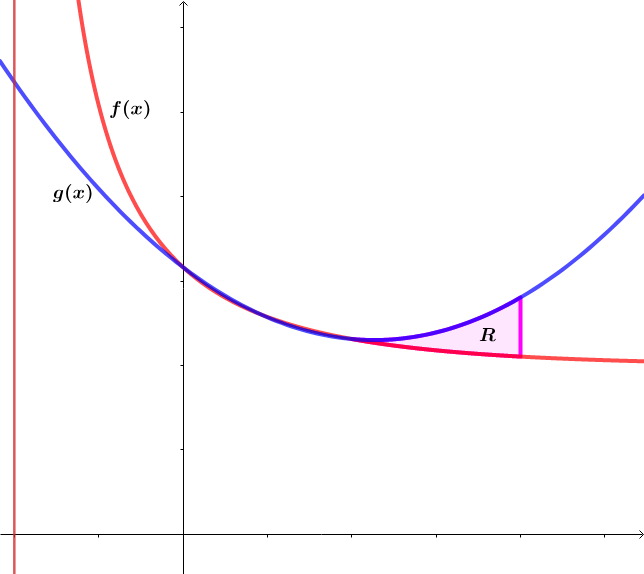It's All Equal Areas

Let be Euler's number and .
Let and .
If , and , find the area bounded by and on to eight decimal places.
The answer is 0.12937127.
This section requires Javascript.
You are seeing this because something didn't load right. We suggest you, (a) try
refreshing the page, (b) enabling javascript if it is disabled on your browser and,
finally, (c)
loading the
non-javascript version of this page
. We're sorry about the hassle.
f ( x ) = lim n → ∞ ∑ j = 1 n ( n j ) n ( e x 1 ) n − j = lim n → ∞ ∑ j = 0 n − 1 ( 1 − n j ) n ( e x 1 ) j = ∑ j = 0 ∞ ( e x + 1 1 ) j = e x + 1 − 1 e x + 1 on x > − 1 .
Let g ( x ) = a x 2 + b x + c .
g ( 0 ) = f ( 0 ) ⟹ c = e − 1 e and f ( 1 ) = g ( 1 ) ⟹ a + b = − e 2 − 1 e
∫ 0 1 g ( x ) = ∫ 0 1 f ( x ) = ln ( e x + 1 − 1 ) ∣ 0 1 = ln ( e + 1 ) ⟹ ln ( e + 1 ) = ∫ 0 1 a x 2 + b x + e − 1 e d x = 3 a + 2 b + e − 1 e ⟹
2 a + 3 b = 6 ln ( e + 1 ) − e − 1 6 e
a + b = − e 2 − 1 e
Solving the system above we obtain:
a = e 2 − 1 6 e 2 + 3 e − 6 ( e 2 − 1 ) ln ( e + 1 ) and b = e 2 − 1 6 ( e 2 − 1 ) ln ( e + 1 ) − 6 e 2 − 4 e .
For ∫ 1 2 g ( x ) − f ( x ) d x :
∫ 1 2 f ( x ) d x = ln ( e x + 1 − 1 ) ∣ 1 2 = ln ( e + 1 e 2 + e + 1 )
and
∫ 1 2 g ( x ) d x = 3 7 a + 2 3 b + c = 6 1 4 a + 9 b + 6 c = 6 ( e 2 − 1 ) 3 6 e 2 + 1 2 e − 3 0 ( e 2 − 1 ) ln ( e + 1 )
⟹ ∫ 1 2 g ( x ) − f ( x ) d x = 6 ( e 2 − 1 ) 3 6 e 2 + 1 2 e − 3 0 ( e 2 − 1 ) ln ( e + 1 ) − ln ( e + 1 e 2 + e + 1 ) ≈ 0 . 1 2 9 3 7 1 2 7 .